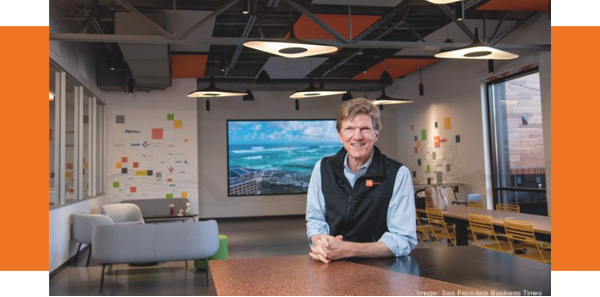
photo by Todd Johnson | San Francisco Business Times
By Neil Gonzales
Oct 23, 2020, 8:00am EDT
Read original article at San Francisco Business Times
Biotech pioneer Doug Crawford has seen many incubator startups develop wings and fly away. Now these biotechs are flying to San Carlos.
The mid-Peninsula city has long had a biotech presence, hosting big companies such as Novartis AG and Mylan N.V. But in recent years, it has seen an influx of startups such as Alkahest Inc., Iovance Biotherapeutics and Nautilus Biotechnology. Now it eyes much more with biotech developments aimed along its historically industrial eastern edges.
Just off of Highway 101, Pasadena-based Alexandria Real Estate Equities Inc. plans to build an expansive campus that provides more than 2 million square feet of biotech space. The Alexandria District for Science and Technology will feature several buildings, a park and other green areas.
In the same vicinity, the biotech incubator MBC BioLabs has proposed a 125,000-square-foot building at 1030 Brittan Ave. The company already has two other sites nearby at 930 Brittan Ave. and 733 Industrial Road that provide fully equipped laboratory space for entrepreneurial scientists seeking to develop, test and market their products.
We caught up with MBC BioLabs founder Douglas Crawford to discuss how San Carlos has turned into a kind of biotech nursery. The biotech pioneer, who is also managing director of the venture-funding firm Mission Bay Capital, talks as well about how the industry has largely been able to thrive amid the pandemic.
Why has San Carlos become a hot space for biotech startups or projects in the incubator stage?
What we’ve seen in the last 20 years is that people want much more complex, diverse neighborhoods. They want to live, work and play all in the same place.
Secondly, we need to provide workplaces that allow people lots of alternatives for transportation, and the Caltrain corridor is the ideal mass-transit corridor.
Thirdly, downtown San Carlos is so cool. Here’s a downtown that has lots of restaurants and cafes. It has a jazz club. Being a small or medium-sized company in San Carlos means you can go out to lunch. You can have meetings with folks. You can really attract employees.
Also, the city made a decision that the corridor between Highway 101 and El Camino Real is ideally situated for the conversion to high tech and biotech. I think we were the very first to apply for the construction of a new building after that decision.
How do you envision San Carlos’ biotech evolution?
The future for San Carlos will be to be the progenitor – the research arm that drives new innovations in therapeutics. I think it’ll be 15 years before biotech in San Carlos reaches its zenith.
It used to be that if you wanted to be a drug company you needed to be able to do everything that was involved. You had to do chemistry and biology. You had to have animal facilities. You had to be able to manufacture.
Now you can be a three-person startup and hire chemistry, animal or other services from the same companies that Pfizer would go to. Your three-person company can punch with the same weight as Pfizer.
The gap between an idea and the realization of that idea is getting smaller and smaller. The whole industry has been transformed.Will biotech companies swoop up the empty office spaces in San Francisco? Hard to do. When you build a biotech building, everything — the floor clearances, your electricity, your HVAC — has to be built for biotech. The conversion of an office to a biotech building can be done, but it’s hard to do efficiently and well. It’s better to start from scratch and say, “We’re going to do biotech.” While there’s a lot of vacancy and handwringing in the office marketplace, the opposite is true in the biotech market: There are no vacancies.
Why is biotech doing much better than other sectors during this pandemic?
In the office space, everyone who can is working from home. So those companies are asking, “Why are we renting big office complexes if no one’s in them?” Anyone who can back out of a lease or close down is. In our industry, you can’t do that. It has to happen in the lab. In that way, we have continued to be strong.
Also, if you think about the human needs, there are so many diseases for which we have no pharmaceutical interventions. The ultimate demand for the goods we are producing is insatiable.
What particular challenge do new startups or those graduating from your incubator face?
It has been really challenging for our graduates to find the appropriate space. It could take them 10 to 12 months to find space after they leave us. Because that’s a real-estate transaction, they’re often asked to sign long leases, but they don’t know what their growth trajectory is going to be. Are they going to be growing at five employees a year or 20 employees a year? So they frequently end up having to take much more space than they need for that transition.
How is MBC BioLabs helping address that transitional space issue?
What we all like to do is find more fluid ways to accommodate their growth. The building at 1030 Brittan is designed specifically to allow companies to go from 15 to 25 or 30 employees and do that in small increments. We hope to have that building ready in 2023. Alexandria is offering spaces that would be appropriate for 30 employees to go to 150. Then San Carlos, we and Alexandria can be working hand in glove to be able to have a smooth growth trajectory, allowing companies to never have to leave San Carlos.
Neil Gonzales is a Redwood City-based freelance writer.
